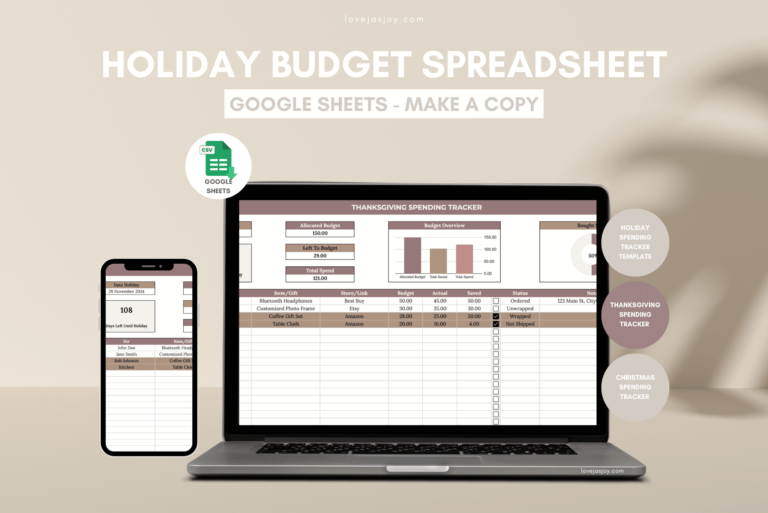Income-Based 52 Week Money Saving Challenge for the New Year!

Get ready to kickstart your savings for this upcoming year! It is time to embrace an Income-Based 52 Week Money Saving Challenge. This strategy is perfect for anyone and everyone. You can’t say “I don’t have THAT much to save,” because this challenge can be altered to your income. So, here we come New Year! We are ready to secure our financial future and reach our savings goal!
WITH THAT SAID, HERE IS AN INCOME-BASED 52 WEEK MONEY SAVING CHALLENGE FOR THE NEW YEAR!!
Please note that this site contains affiliate links to products or services from third-party websites. Furthermore, we are not financial advisors. The information provided is for general informational purposes only and should not be considered as professional financial advice. By reading this post, you acknowledge and agree to the full terms of our disclaimer.
Table of Contents
"There is a time for everything, and a season for every activity under the heavens:"
Ecclesiastes 3:1 Tweet
Understanding the Income-Based Money Saving Challenge
Tips to Get Started
Tips to Start the Money Saving Challenge: Assess Your Income
Assess Your Income
Tips to Start the Money Saving Challenge: Set a Realistic Savings Percentage
Set a Realistic Savings Percentage
Tips to Start the Money Saving Challenge: Automate Your Savings
Automate Your Savings
Setting automatic transfers to your savings or certificate will eliminate the temptation to spend it before you can save it. Automated transfers ensure consistent contribution and will aid in building financial discipline.
Tips to Start the Money Saving Challenge: Use a Budget Binder Instead
Use a Budget Binder
If your bank does not allow automatic transfers or if you just like to save by cash, a budget binder is perfect for you! You can allocate your cash to specific categories in a pvc waterproof envelope.
Budget Binder Includes:
- A 6 ring leather binder
- 30 category decorative labels + Writable labels
- 12 expense budget sheets
- 10 zipper dust free envelopes
Effective Ways to Save More Money
Effective Ways to Save More Money: Budget wisely and stick to it
Budget Wisely and Stick to It
It is important to create a budget and track your expenses to the T. Doing so will help you see just how much you spend and what you spend on. If you notice you have been spending too much in a certain category (e.g., dining out), take the initiative to cut down on it.
If you need help creating your budget, check out our article: Simple Guide to Budgeting
Take a look at the many Budget Planners that are available to you: The Best Budget Planners
Effective Ways to Save More Money: Know Your Financial Priorities
Know Your Financial Priorities
Effective Ways to Save More Money: Pay Yourself First
Pay Yourself First
Keep just enough money in your account to pay for bills and cover variable expenses, the rest, use it to pay yourself first! Instead of using the remaining to splurge, build the financial discipline of saving it!
It is imperative to pay yourself first by building up your savings, because most of your money is already being used to pay someone else.
Effective Ways to Save More Money: Embrace Frugal Habits
Embrace Frugal Habits
Execute more cost-effective alternatives in your daily life. Whether it’s meal prepping, making coffee at home, or using coupons, every penny saved counts!
Effective Ways to Save More Money: Find Additional Income Streams
Find Additional Income Streams
Consider side gigs or freelance work to supplement your primary income. Even small earnings contribute significantly to your savings.
Effective Ways to Save More Money: Incremental Increases As You Earn More
Incremental Increases As You Earn More
As you continue to earn more, save more! But first, review your bills, if your bills have increased, keep your savings amount the same. If it is the same, opt in saving more.
Another thing to consider is the rate of inflation. If this year’s inflation rate is the same or higher than your percentage of pay increase, stick to the same savings amount. If it is lower, save more!
Factors to Consider Throughout This 52 Week Money Saving Challenge
Factors to Consider: Build Your Emergency Fund
Build Your Emergency Fund
You may have some other savings goal in mind, like saving for a car, but the first thing you need to save for is your emergency fund. Your emergency fund is important for covering unexpected expenses and emergencies. Aim for at least $2500 or three months’ worth of living expenses before directing excess savings elsewhere.
Factors to Consider: Budget Adjustments and Flexibility
Budget Adjustments and Flexibility
Be receiving to life’s changes. Life can be unpredictable and at times there is not much we can do about the circumstance itself. But we can do the best we can to make being in the circumstance less stressful.
With that said, be flexible and adjust your savings plan if your income fluctuates, unexpected expenses arise, or even if you need to pull out some of the money you’ve been saving.
Factors to Consider: Avoid Lifestyle Inflation
Avoid Lifestyle Inflation
Factors to Consider: Revisit and Reassess Your Budget
Revisit and Reassess Your Budget
Factors to Consider: Long-Term Planning
Long-Term Planning
Think beyond your Short-Term financial goals! Consider long-term financial objectives. Look into retirement planning, investments, or property ownership for future financial security!
Example: If you are looking to purchase a house in the future, open a certificate to start saving up for a down payment.

Best Budget Planners
These are some of the best budget planners out there! Any one of these will support you during your 52 week money saving challenge.
Celebrate Each Dollar Saved and Stay Consistent
Celebrate Money Saving Achievements
You’re doing it! You’re working hard towards your savings goals and prioritizing what benefits you the most in the long run. Reward yourself, but ensure rewards align with your budget.
Stay Consistent with Saving Money
Consistency is key. At first it may seem like a chore or a challenge, but as you continue to be consistent, it will soon become a habit and then second nature.
Even during months with unexpected expenses, strive to maintain your savings commitment to the best of your ability! Of course, if bills just can’t let you save, don’t dig yourself into a hole by being negative in your account.
52 WEEK MONEY SAVING CHALLENGE TEMPLATE + EXAMPLES

52 week money saving challenge example 1: part-time earner
Part-Time Earner
Net Monthly Income: $1,300
Commit to Saving At Least 10%:
- $1300 x 12 months = $15,600 annually * 10% = $1,560 to Save Annually / 52 weeks = $30 to Save Weekly
Budgeting Tips: Opt for cost-effective alternatives in daily routines, like preparing meals at home or using public transportation to save on commuting costs.
Savings Progression: Aim to increase your savings percentage gradually as your income grows or when working additional hours.
52 week money saving challenge example 2: Entry-Level Earner
Entry-Level Earner
Net Monthly Income: $2,000
Commit to Saving At Least 10-15%:
- $2000 x 12 months = $24,000 annually * 10% = $2,400 to Save Annually / 52 weeks = $46.15 to Save Weekly
Budgeting Tips: Track expenses meticulously and prioritize essential spending. Consider using budgeting apps to monitor your finances more effectively.
Savings Progression: As you gain experience or receive pay raises/bonuses, incrementally increase your savings percentage to 15-20%.
52 week money saving challenge example 3: Mid-Level Earner
Mid-Level Earner
Net Monthly Income: $3,000
Commit to Saving At Least 15-20%:
- $3000 x 12 months = $36,000 annually * 10% = $3,600 to Save Annually / 52 weeks = $69.23 to Save Weekly
Budgeting Tips: Consider paying off more of your debt and decrease your daily expenses.
Savings Progression: Again, incrementally increase your savings percentage (20+%) as you continue to earn more.
The Income-Based Money Saving Challenge isn’t just about saving money; it is also about cultivating a mindset of financial responsibility and security. By aligning your savings goals with your income, you’re securing your way toward a brighter financial future
Don’t wait until January 1st to take charge of your finances. Start NOW with this adaptable and effective savings challenge! With dedication and a strategic approach, you’ll find yourself closer to your financial aspirations than ever before!
Remember, your financial journey is unique. Customize this challenge to suit your needs and watch your savings grow steadily throughout the year. Happy saving!
love, Jas Joy
Other Posts You May Like
Related Topics





